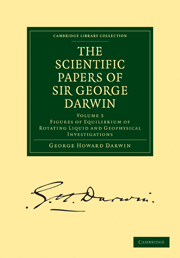 The Scientific Papers of Sir George Darwin
The Scientific Papers of Sir George Darwin Published online by Cambridge University Press: 07 September 2010
INTRODUCTION
As far as I know, Airy was the first to include quantities of the second order in investigating the theory of the Earth's figure; his paper is dated 1826, and is published in Part III. of the Philosophical Transactions of the Royal Society for that year.
He gave the formula for gravity which I have obtained below (§ 6 (40)). Our results would be literatim identical but that my e is expressed by e ÷ (1 – e) in his notation, and that I denote by − f the quantity which he wrote as A. He also established equations, equivalent to my (13) and (14), which express the identity of the surfaces of equal density with the level surfaces. He remarked that these may be reduced to the form of differential equations, but he did not give the results, since he found himself unable to solve them, even for an assumed law of internal density. I have succeeded in solving these equations in this paper.
Airy further concluded that the Earth's surface must be depressed below the level of the true ellipsoid in middle latitudes. He gave no numerical estimate of this depression, but expressed the opinion that it must be very small.
In the second volume of his Höhere Geodäsie, Dr Helmert has also investigated the formula for gravity to the second order of small quantities.
To save this book to your Kindle, first ensure [email protected] is added to your Approved Personal Document E-mail List under your Personal Document Settings on the Manage Your Content and Devices page of your Amazon account. Then enter the ‘name’ part of your Kindle email address below. Find out more about saving to your Kindle.
Note you can select to save to either the @free.kindle.com or @kindle.com variations. ‘@free.kindle.com’ emails are free but can only be saved to your device when it is connected to wi-fi. ‘@kindle.com’ emails can be delivered even when you are not connected to wi-fi, but note that service fees apply.
Find out more about the Kindle Personal Document Service.
To save content items to your account, please confirm that you agree to abide by our usage policies. If this is the first time you use this feature, you will be asked to authorise Cambridge Core to connect with your account. Find out more about saving content to Dropbox.
To save content items to your account, please confirm that you agree to abide by our usage policies. If this is the first time you use this feature, you will be asked to authorise Cambridge Core to connect with your account. Find out more about saving content to Google Drive.